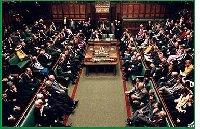b) This house believes in nuclear deterrent
c) This house believes that terrorism is never justified
One member from each of these teams spoke
so it was not an actual debate.
Finally the debate was started. The higpoint of the debate was when a team called
Bollywood "creative and original."
All in all it was excellent and each of us learnt a lot. Andrea Coomber was very helpful
and did not talk to us in professor lecture like manner.
We hope that more workshops for us will be and many more debates along the International
Parliamentary Style of debate.
Saloni Mira Rai
XI C

At the end of the First Government's speech, the First Opposition speaks. He may challenge the definition, issue and the scope of the debate, as set by the government. But if he chooses to do so, he must offer his own definition, issue and scope of the debate. The First Opposition also rebuts or refutes the government's case or the argument presented. He spends two minutes in doing so and then continues to represent his own case.
After this the Second Government and the Second Opposition speak (in that order). These speakers are generally given the meatier part of the arguments, as they will have more time to discuss it. They must also rebut and refute the previous speaker's case and prove to the judges and audience that their own team is right and the others are not. The Second Speaker of each team spends at least three to four minutes rebutting and then carries on to present his matter, followed by a summary at the end. This is followed by the Third Government and Third Opposition Speakers. Their main role is to point out the points and shortcomings of their opponent's arguments and give a brief summary at the end, of not more than two to three sentences.
At the end of the Opposition's speech, the first opposition speaker gives a reply speech. Reply speeches are the ones given after the substantive speeches and last for about three to four minutes.No points of information may be posed during a reply speech. The reply speech is used to summarize the trends and issues of the debate, the case as presented by both sides and it is used to summarize the main arguments of the team. After the first opposition's reply speech, first government follows suite. No new material may be presented in reply speeches.As many may have seen this style of debate is more exciting and definitely more demanding than the way we usually debate. During the debate each one must listen attentively due to the points of information that must be offered and rebuttal that follows. Catching the other team on mistakes and errors get you good marks (even in cases when they don't work along their split!).
In the last one and a half-hours, Andrea Coomber selected six kids (including me) and we were divided into groups of three. We were going to make a debate along the lines of this style and the most important, "This house believes that Bollywood is better than Hollywood."
I was the third opposition speaker. We prepared for one hour and twenty minutes. Meanwhile the others were split into four groups and their topics were: